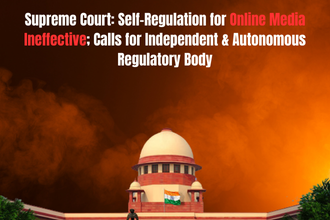In a significant development in the ongoing legal tussle between Wikipedia (Wikimedia Foundation) and Asian News International (ANI), the former has withdrawn its appeal pending before the Delhi High Court. This move follows the recent Supreme Court ruling that set aside the earlier High Court decisions, allowing the single-judge bench to rehear the matter afresh. The case, which touches upon defamation, intermediary liability, and the limits of content moderation, has raised important legal and constitutional questions.
Background of the Case
The origins of the dispute lie in ANI’s complaint that Wikipedia allowed defamatory edits on its page, branding the news agency as a “propaganda tool” of the Central Government. ANI alleged that Wikimedia Foundation had enabled anonymous users to make these derogatory statements, causing reputational harm.
On July 9, 2024, the Delhi High Court issued summons to Wikipedia and directed the platform to disclose the identities of three editors responsible for the changes. However, Wikipedia resisted the order, citing user privacy and instead chose to serve notices on those users rather than revealing their identities publicly.
This order was challenged by Wikimedia before a Division Bench of the Delhi High Court, headed by Justice Prathiba M Singh and Justice Rajneesh Kumar Gupta, which on April 8, 2025, upheld the original single-judge decision dated April 2, 2025.
Supreme Court’s Intervention
Unhappy with the High Court’s orders, Wikimedia approached the Supreme Court of India, which intervened and provided relief. In its ruling, the apex court set aside both the April 2 and April 8 orders, observing that the directions issued were overly broad and lacked specificity.
The Court emphasized a critical legal principle:
“Such a broad interim relief is not capable of being specifically implemented. The reason is that there is no clarity on the issue of who will decide whether the contents are false, misleading and defamatory.”
The Supreme Court granted ANI liberty to move the single-judge bench afresh, effectively remanding the matter back to its original judicial forum for reconsideration.
Withdrawal of Appeal in Delhi High Court
In light of the Supreme Court’s verdict, Wikimedia Foundation moved an application to withdraw its pending appeal before the Division Bench of the Delhi High Court. This application was listed before Justices Prathiba M Singh and Rajneesh Kumar Gupta, who allowed the withdrawal, taking into account the apex court’s ruling.
The case will now be heard afresh by a single-judge bench of the Delhi High Court, where ANI is expected to renew its arguments regarding Wikipedia’s alleged failure to prevent or remedy defamatory content.
Key Legal Issues in the Case
This case brings to the forefront several key legal issues with broad implications:
1. Defamation and Reputation of Media Houses
ANI’s primary contention is that being labeled as a “propaganda tool” harms its reputation and journalistic integrity, potentially amounting to actionable defamation under Indian law. The case raises questions about:
- Whether Wikipedia can be held liable for user-generated defamatory content.
- How courts should balance allegations of defamation with protections for free speech and intermediary rights.
2. Intermediary Liability and Safe Harbour
Under the Information Technology Act, 2000, platforms like Wikipedia are granted safe harbour protection for third-party content, provided they comply with takedown notices and due diligence obligations.
- This case tests whether Wikipedia breached these obligations by not removing the edits after being notified.
- The broader question is whether Wikipedia’s refusal to disclose user identities weakens its safe harbour defense.
3. Privacy and Anonymity of Internet Users
Wikipedia’s decision to withhold the identities of the editors highlights the tension between user privacy and the right to legal remedy for alleged defamation victims.
- Can courts compel online platforms to reveal user data when defamation is alleged?
- How should the balance be struck between privacy rights and accountability?
4. Judicial Oversight and Specificity of Orders
The Supreme Court’s decision underscores the importance of judicial precision when issuing interim orders. Broad and vague directives are legally problematic and difficult to enforce.
This judgment reinforces the principle that courts must clearly define the scope and grounds of interim relief, especially in defamation and free speech cases.
Broader Implications for Online Speech
This dispute between ANI and Wikimedia is emblematic of a larger conflict brewing across the digital world—how to regulate user-generated content without stifling free expression.
- News organizations increasingly seek legal recourse against platforms for reputational damage.
- Online platforms, meanwhile, are pushing back to defend user anonymity and editorial neutrality.
- Courts are now tasked with developing jurisprudence that upholds constitutional protections while ensuring legal remedies for aggrieved parties.
As the matter returns to the single-judge bench, it will be closely watched by media entities, digital rights activists, legal experts, and intermediaries alike.
Conclusion
The Supreme Court’s intervention in the Wikipedia v. ANI defamation case reaffirms the judiciary’s commitment to clarity, fairness, and legal due process. Wikimedia’s withdrawal of its appeal in the Delhi High Court paves the way for a fresh and more focused adjudication of ANI’s claims.
While the core issues of defamation, intermediary responsibility, and user privacy remain unresolved, the upcoming proceedings before the single-judge bench will offer another opportunity to develop India’s evolving legal framework on digital speech and accountability.
Stay tuned as we continue to cover this high-stakes legal battle.


